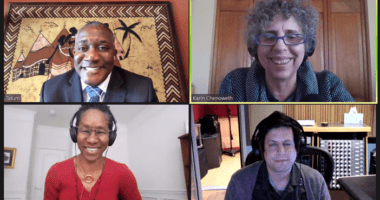What Can States Do to Improve Reading Instruction?
When Tennessee showed no progress on the last results of the National Assessment of Educational Progress and Massachusetts actually declined, both states were spurred to make some major changes to improve the reading instruction in their states.
In this episode, Dr. Lisa Coons, chief academic officer of the Tennessee State Department of Education, Dr. Heather Peske, senior associate commissioner, Massachusetts Department of Education, and Katherine Tarca, director of literacy and humanities in the Massachusetts Dept. of Education, discuss what those two states are doing.
Coons describes a statewide effort that is being driven by the governor, legislature, and state department of education to provide training for aspiring and existing teachers and school leaders, curricular resources, and tutoring services for students who are not proficient in reading. “This is pretty comprehensive. It is pretty intense,” Coons said.
Social media, she said, has helped spur efforts within Tennessee to ensure that all children learn to read well. Part of that is a series of podcasts by American
Public Media’s Emily Hanford, which has brought an intense scrutiny on reading instruction and the training teachers receive in their teacher preparation programs. The podcasts were cited by the Council of Chief State School Officers in its call to states to improve reading instruction, a call which prompted ExtraOrdinary Districts to produce a series of episodes on reading instruction.
In Massachusetts, a new campaign called Mass Literacy is focused on providing grants, creating resources, and providing information about evidence-based reading instruction to educators in the state’s 400 school districts. “We’re trying to promote the idea that all our students have the right to learn in a culturally responsive and affirming environment,” said Tarca. “All students deserve to read wonderful literature. And all students deserve to be taught to read fluently and pull the print off the page. And none of those things are mutually exclusive.”
Although the Massachusetts effort is much smaller in terms of budget and scope than Tennessee, “One of the messages you’re hearing from us,” said Peske, “is the importance of coherence within the state agency and using the available levers to us whether it’s licensure, educator preparation, in-service professional learning, access to high-quality instructional materials.”
Podcast: Play in new window | Download
Subscribe: Apple Podcasts | RSS




